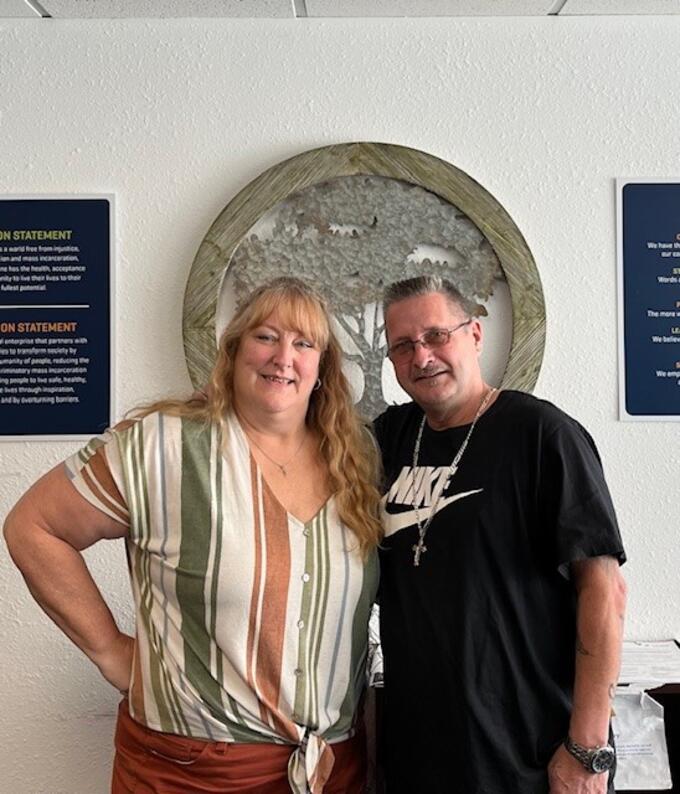Treatment and Wraparound Support Produces a Healthy and Productive Life
You are here
- Home /
- About /
- Success Stories /
- Treatment and Wraparound Support Produces a Healthy and Productive Life

We are very proud to share the story of how treatment and supportive wraparound services helped Steve after he was released from prison. He progressed successfully through various programs and received peer and community support from several Pioneer teams.
--------------------------------------------------------------------------------------------------------------------------------
Starting at a young age, Steve struggled with substance abuse that led to an extensive criminal history. He spent 21 years of his life in a state prison and over 16 months in federal custody. Despite multiple unsuccessful attempts at treatment in the past, his involvement in a Rider Program, while in Idaho State Prison, ultimately led to his sobriety in December 2021.
Treatment After Prison
Upon his release, Steve showed his determination to sustain his sobriety/recovery by voluntarily requesting residential treatment at Pioneer Center East (PCE) in Spokane where he engaged in Moral Reconation Therapy (MRT) with Krisanne Hensley, SUDP lead, as he was seeking structure and support to maintain his progress. MRT is a type of behavioral therapy aimed at decreasing the likelihood of someone returning to abusing substances or alcohol. It teaches people in the criminal justice system with substance use disorders to focus on the moral aspects of their illness, and the social consequences that may be associated with using drugs or alcohol.
Reentry And Outpatient Treatment
After completing MRT and the treatment program at Pioneer Center East, Steve voluntarily requested to be placed at the Spokane Residential Reentry Center (SRRC), a center for individuals released from federal prison. He wanted to continue the structured support in his life. While at the reentry facility, Steve completed job-readiness training courses from Pioneer’s Roadmap to Success program in SRRC. He worked with Joseph Parham, SRRC employment specialist, and the job training, along with support he received from his Foundational Community Supports (FCS) supportive employment specialist, helped Steve secure immediate employment with Goodwill. He also enrolled in the intensive outpatient (IOP) substance use disorder program at Pioneer Counseling–Emerson Clinic while he was in SRRC preparing to be released back into the Spokane community. He completed IOP a few months later while he was living at the Oxford House.
Pioneer Support Services
Kathleen Singleton-Apel, Pioneer's Supportive Employment supervisor on the FCS team, stated, “Steve is a notable client who began his journey with our FCS team in a professional capacity by first enrolling in our Peer Bridger program with Michelle McIntosh, followed by enrolling in a Supportive Employment program with me while he was in-patient at PCE. He then worked with Michelle again within the Supportive Housing program.”
Pioneer’s FCS Supportive Employment and Housing services are designed for individuals experiencing barriers to employment and housing stability. Our specialists provide participants with support in obtaining community services including, but not limited to: healthcare, social services, resources, housing, employment training, recovery education and many other supports.
Kathleen continued, “Our FCS team has been actively assisting Steve to navigate the necessary steps to achieve his ongoing goals and objectives, including securing a successful transition out of SRRC to reside at an Oxford House so he could continue with clean and sober housing support. He continues to reside at Oxford, and is actively working with Michelle to secure his own apartment.”
Steve has sustained his work with Goodwill and has already been promoted once. He is now working towards another promotion because he is excelling in his current position. Recently, Steve added a new employment goal to get a Certified Peer Counselor certification as he wants to become a Peer Support. Steve said, “I want to help give back to people who’ve experienced what I’ve gone through… even better, I would love to do it as an employee with Pioneer.” Also, he has goals to eventually test for his commercial driver’s license (CDL) to expand his future employment opportunities.
Throughout his journey, Steve has expressed gratitude for the support he continues to receive from Pioneer and the FCS team. He shared, “I never thought it was possible to get where I’m at without drugs. But, I’m proof you can have it if you want it, you just got to want it more than anything else.” He added, “The treatment and support teams at PCE, and the support of Michelle and Kathleen from the FCS Peer Bridger, Supportive Employment, and Supportive Housing team has been amazing. They have helped me in every way possible. This level of wraparound support is a blessing and I truly doubt I could have done it as smoothly without my Pioneer Dream Team.”
Some of Steve’s current employment barriers include restrictions to only eastern Washington under his Idaho/WA interstate compact and Federal USPO supervision. Kathleen commented, “I have been supporting Steve in his efforts to gain early supervision discharge from Idaho State supervision with Kootenai Courts. He attempted it two months ago, and with positive feedback from the judge, he was directed to resubmit for discharge in a few months. We are very optimistic about a successful outcome by the end of this month. Additionally, plans are in place for Steve to seek early supervision completion from federal court USPO supervision this summer.”
Steve's inspiring transformation and tenacity serves as a testament to the power of determination and wraparound services. It also points to the amazing success that program and resource support services can provide to individuals overcoming challenges.
Kathleen concluded, “Steve’s journey underscores the importance of a comprehensive approach to rehabilitation and the positive impact of a dedicated team working towards a common goal to facilitate positive change. We are all proud to support him on his path to continued success.”
Pictured from left: Kathleen Singleton-Apel, Supportive Employment supervisor, FCS; Steve

